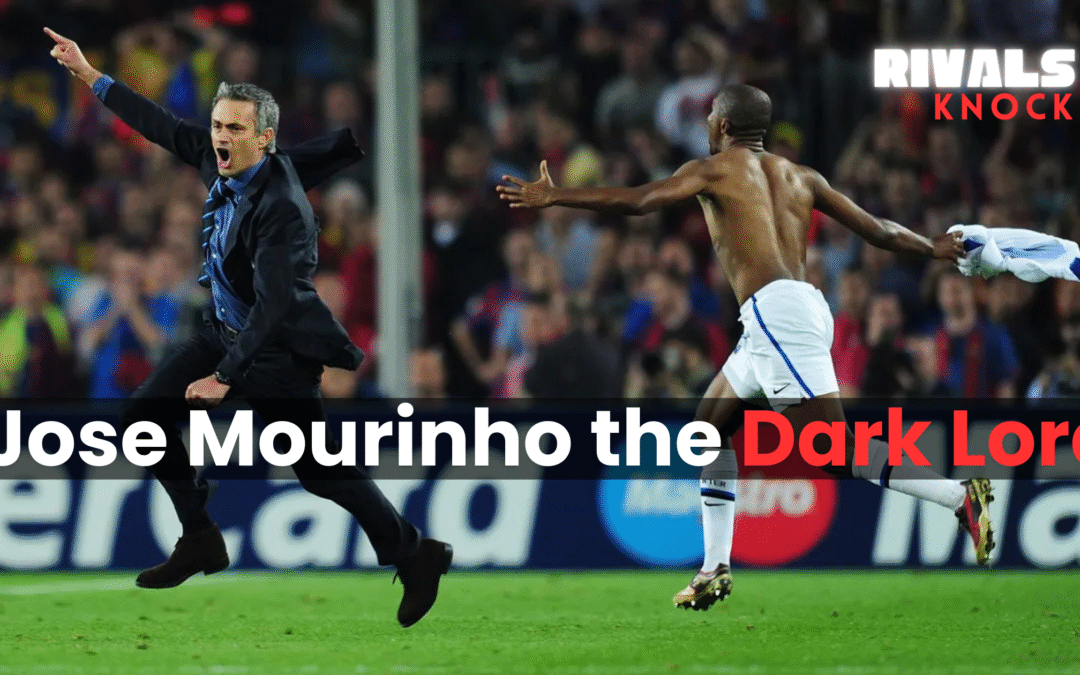From Translator to Outcast: The Barcelona Rejection That Forged a Legend
In the late 1990s, Jose Mourinho was not “The Special One.” He was “The Translator”—a sideline figure in the grand halls of FC Barcelona, serving under coaching icons like Bobby Robson and Louis van Gaal. Sharing space with future coaching rival Pep Guardiola, Mourinho’s role was modest: interpreting press conferences, translating tactics, watching from the shadows.
But beneath that surface brewed ambition. And resentment.
Barcelona’s proud Catalan identity never truly embraced Mourinho. He wasn’t “one of them.” So when Frank Rijkaard stepped down in 2008, and Barcelona stood at a crossroads, Mourinho’s name was among the front-runners. A Champions League and UEFA Cup winner with Porto. Two-time Premier League champion with Chelsea. A man with silverware, scars, and swagger.
Yet Barça turned inward, choosing Pep Guardiola—then managing their B team. A Culer by blood. A symbol of their values.
Mourinho didn’t just lose a job that day. He lost a war of identity. “That’s the moment he becomes the Dark Lord,” said journalist Jonathan Wilson. Mourinho chose vengeance. If Barcelona lived to dazzle with the ball, he would thrive by taking it away. If they played for joy, he would make football joyless.
The stage was set. And Inter Milan would become his sword.
A Siege Mentality: Building Inter Milan’s Family of Rejects
When Mourinho took over Inter Milan in 2008, the club was powerful domestically but adrift in Europe. He needed more than tactics—he needed warriors.
He found them in the overlooked, the cast-offs.
Samuel Eto’o, shown the door by Guardiola. Wesley Sneijder, unwanted by Real Madrid. Walter Samuel, forgotten. These men weren’t just players—they were wounded egos, and Mourinho gave them purpose.
Captain Javier Zanetti recalled it vividly:
“Mourinho created a family… I would throw myself into a fire for him.”
Asados in training camp. Long talks in private. He built not just tactics, but trust. His system started with a narrow 4-3-1-2, led by Sneijder’s vision, but results in Europe were rocky—three draws in the group stage.
So Mourinho adapted. Inter became ruthless on the counter. Precise. Aggressive. United.
Against Chelsea in the Round of 16, Eto’o delivered the winner at Stamford Bridge, stung by his Barcelona exit.
“Samuel won us that quarter-final,” Mourinho said.
That win wasn’t just progression. It was a declaration.
Inter, built on rejection, was now roaring with belief.
The final obstacle? His old home. His old wound.
The Camp Nou Cauldron: Mourinho’s Defiant Masterclass
April 28, 2010. Camp Nou was thunderous, seething, hopeful. Barcelona needed to overturn a 3-1 first-leg defeat. The fans unfurled a massive banner: “We’ll do it again.”
The tension had cosmic scale—literally. The Eyjafjallajökull volcano in Iceland had grounded planes. Barcelona traveled by bus for 10 hours to Milan. The earth itself seemed to rage.
Mourinho, always the dramatist, was ready for war.
Twenty-eight minutes in, Thiago Motta was sent off. Ten men. Sixty-two minutes left. Possession stats bled blue and red—Barcelona had 81%, Inter had only 19%. But Mourinho didn’t need the ball.
He needed the result.
Zanetti and Cambiasso shadowed Messi relentlessly. Lucio and Samuel threw themselves into blocks. Julio Cesar commanded the box like a general under siege.
Barcelona scored in the 84th minute—Piqué’s flick giving them hope. Then Bojan found the net. Camp Nou erupted. But the goal was ruled out.
Full-time.
Inter had lost 1-0. But they’d won the war 3-2 on aggregate.
Mourinho sprinted across the pitch, fists clenched, wild with joy. Sprinklers came on—Camp Nou’s petty farewell to the man who outwitted them. But the pitch belonged to him now.
“It was the most beautiful defeat of my career.”
Barcelona’s purity was pierced. The man they mocked had returned—not to translate, but to obliterate.
Santiago Bernabéu Triumph: Sealing the Treble and a Real Madrid Destiny
May 22, 2010. Inter Milan vs Bayern Munich. Champions League final. At the Santiago Bernabéu—home of Real Madrid, Barcelona’s eternal rival.
It couldn’t have been scripted better.
Inter’s defense suffocated Bayern. Diego Milito, clinical and composed, struck twice—once after a delicate Sneijder assist, again with a devastating solo move.
Final score: 2-0.
Inter had done it.
The Treble: Serie A. Coppa Italia. Champions League. The first Italian club to ever achieve it.
Guardiola’s Barcelona had dreamed of lifting the trophy in Madrid. Piqué called it a “super orgasm” of symbolism. But Mourinho had slammed the gates shut.
He celebrated. Not with wild arrogance—but with the weariness of a man who’d proven a point the world didn’t want to hear.
In the Bernabéu car park, Mourinho hugged Marco Materazzi. Both men wept. He was already leaving for Real Madrid.
The Dark Lord had claimed his throne. And now, he’d join the kingdom that wanted vengeance just as much as he did.
Legacy of the Dark Lord: A Shift in Football’s Philosophy
Mourinho’s triumph didn’t just shake the scoreboard—it shook football’s soul.
His Inter side had only 19% possession at Camp Nou. Yet they won. This wasn’t luck. It was calculated suffering. A blueprint.
In 2012, Chelsea mimicked it to defeat Barcelona in the Champions League semi-finals. Atletico Madrid and other underdogs followed. The gospel of tiki-taka had met its counter.
“Teams learned to ignore the siren call of Barcelona’s possession,” wrote The Guardian.
At Real Madrid, Mourinho halted Guardiola’s domestic dominance, winning La Liga in 2011/12 with a record-breaking 100 points.
Though Barcelona triumphed in Europe again in 2011, Mourinho had cracked the aura. He made it okay not to be beautiful. He made it okay to win ugly.
His Inter Milan team—labeled “a collection of gifted rejects”—became a parable. Of grit. Of fury. Of a coach who weaponized disrespect.
Rivalry Rewritten: What Mourinho’s Inter Meant
For Rivals Knock readers, this is more than a football tale. It’s war, identity, and vengeance stitched into ninety minutes.
Jose Mourinho didn’t just beat Barcelona in 2010. He dismantled the idea that beauty was everything. He proved that genius wears many masks—even one soaked in cynicism and chaos.
He didn’t belong to the club. He broke it.
He wasn’t part of their culture. He crushed it.
The Dark Lord wasn’t born evil. He was made—by mockery, by pride, by rejection.
Now the question is yours:
Did Mourinho’s pragmatism save football from aesthetic tyranny—or did it darken the game’s soul forever?
💬 Join the debate using #DarkLordDebate on X, and let your voice be heard.

